#liszt sonata
Text
*Sonata in B minor*
Low effort mental breakdown post
#liszt#franz liszt#brahms#johannes brahms#classical music#classical music memes#history#history memes#spongebob#krystian zimerman#liszt sonata in b minor#spongebob memes#digital art#procreate
48 notes
·
View notes
Text
Hey guys here's a sign to listen to that piece that you've been putting off bc you're too busy or whatever bc I just finally listened to the Liszt Sonata and I have new brainrot
3 notes
·
View notes
Note
Hey! Can you play your sonata in b minor?
I'll be the piano.
For sure, my darling. Concede me though to not only limit my performance with bare hands, but resort to all means of mine which can produce art...
6 notes
·
View notes
Text
i forgot how crazy my technique routine from march was until im just incorporating it back in now… hanon exercises 1-20 with repeats 2x a day then all scales and arpeggios then octaves. and THEN i would have gone through my entire diploma programme… i miss the rage etc
#my arms collapse at exercise 18 lol#but it will be worth it in the end#considering getting the other two hanon books because this one has beem so useful#but then i also need to buy the liszt consolations#and the haydn sonata#and well it all adds up#but i will persevere i need my technique to be good for my audition in…whenever it is#poeme#thats my spam tag its short and sweet snd after my favourite winning pieve scriabin poeme op 32 no 1 in f sharp#i lofe f sharp
3 notes
·
View notes
Text
There's something so lovely about hearing piano recordings of fantastic musicians and hearing faint humming along. It's like they're directly projecting the version of what they hear in their head through the keys itself.
2 notes
·
View notes
Text
Concert review, ★★★★★, Aleksandr Kliuchko @ Aula der Universität, Zurich, 2023-10-11 (Musik an der ETH und UZH) — Liszt: Études d'exécution transcendante, S.139 (1 – 5, 8, 11, 12); Rachmaninoff: Morceaux de fantaisie, op.3; Rachmaninoff: Piano Sonata No.2 in B♭ minor, op.36; encore 1: Tchaikovsky, Nocturne; encore 2: Feinberg/Tchaikovsky, Symphony No.6 op.74, III. Allegro molto vivace
Blog post #653 —
Photos © Rolf Kyburz, all rights reserved
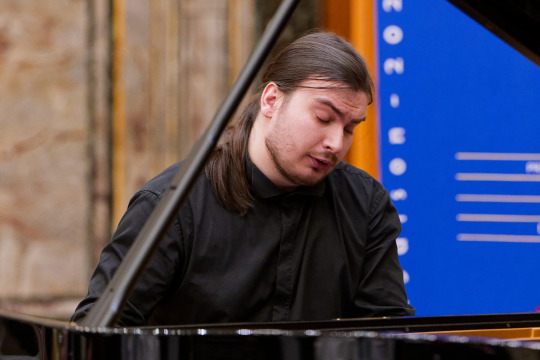
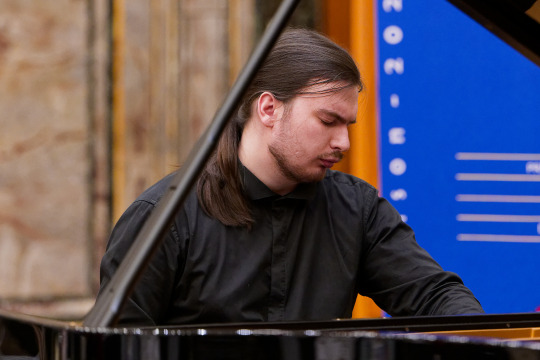
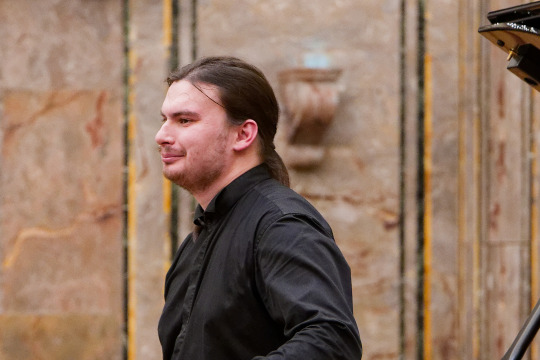

#rolfsmblog#concert review#concert#concert photography#kliuchko#aleksandr kliuchko#liszt#franz liszt#rachmaninoff#études#morceaux#prélude#piano sonata#nocturne#tchaikovsky#feinberg#symphony#transcription#piano recital#piano
0 notes
Text
The Music Rooms. Sometime in the first week. [ OPEN STARTER ]
The ten most difficult songs to play on a piano. Hungarian Rhapsody N. 2, Liszt. Flight of the Bumblebee, Korsakov. Fantaisie Impromptu, Chopin. Piano Concerto N. 5, Beethoven. Moonlight Sonata (3rd Movement), Beethoven. Revolutionary Etude, Chopin. Etude Op. 25 No. 11 - Winter Wind, Chopin. Piano Concerto No. 21, Mozart. Grande Polonaise Brillante Opus 22, Chopin. "Heroic" Polonaise Opus 53, Chopin. Ambrose went over the songs once, twice, upwards of ten times. Over and over again. Hammering out the difficult details of each one until his head started pounding, and his fingers felt like they were going to fall off. But he had to make a good first impression on his instructors. He had to be the best in his classes. He didn't just think that because he was a perfectionist either. He had to be the best because if he didn't prove he could do this - music - while simultaneously making a career out of doing music he'd be nothing but a joke.
He was too deep in his head that his fingers tripped over the wrong keys, and the palms of his hands followed, flattening into a loud angry dissonant sound. He huffed a deep breath lifting his head and noticing someone else must have come into the room sometime in the past thirty minutes. He really did find it unsurprising that he'd really missed a whole person. "Sorry," Ambrose said. I promise I can do better. "Have you been in here long?"
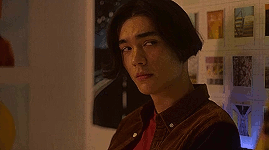
72 notes
·
View notes
Text




*Liszt. I can't edit polls, so just pretend the typo isn't there
Franz Liszt (1811-1886):
Johann Strauss the Younger (1825-1899):
Gustav Mahler (1860-1911):
Antonín Dvořák (1841-1904):
#bonus round#best habsburg bracket#composers 2: Now they have pictures instead of paintings#and they aren't all Austrian#ignore the typo I just noticed and I can't edit polls
55 notes
·
View notes
Text
Matching IkeVamp suitors with classical pieces that likes to invade my brain
Was browsing more classical music to listen to but then I remember I used to get bits of IkeVamp brainrot listening so this list has cometh to be.
Characters Listed: The Residents, William, Vlad and His Minions.
Author Note: why does the bad guys always get the banger ones when it comes to music istg... also did you know? I was about to put Dies Irae (Mozart) in Charles' list before i changed my mind but decided to give it to Vlad instead because i like the vibe (except I gave Vlad Verdi's Requiem of Dies Irae instead because apparently there is another piece titled Dies Irae).
Napoleon
Clair de Lune by Claude Debussy
Arabesque No. 1 by Claude Debussy
Toreador March/Les Toreador by Georges Bizet (specifically that part.)
Vlad
Prelude in C Sharp Minor by Rachmaninoff
Four Seasons, Winter by Antonio Vivaldi
Moonlight Sonata, 3rd Movement by Ludwig Van Beethoven
Lacrimosa by Wolfgang Amadeus Mozart (early composition) and Franz Xaver Süssmayr (finishes the rest of the piece)
(Mozart was unable to finish composing this piece because he passed away. So the person who commissioned this piece hired his student to finish it. Source: Google)
Fantaisie Impromptu by Frederic Chopin
Verdi's Requiem Dies Irae by Verdi
Arthur
Habanera from Carmen Suite by Georges Bizet
Por Una Cabeza Tango by Carlos Gardel
La Campanella by Liszt
Vincent
Peer Gynt, Morning Mood by Edvard Grieg
Four Seasons, Spring by Antonio Vivaldi
Nocturne Op 9 No. 2 by Frederic Chopin
Minuet in G Major by Christian Petzold (said to be attributed to Bach)
Theodorus
Tristesse by Frederic Chopin
Nocturne in C Sharp Minor (No. 20) by Frederic Chopin
Shakespeare
Nessun Dorma by Giacomo Puccini
The Swan/Le Cygne by Saint-Saens
Fur Elise by Ludwig Van Beethoven
Leonardo
Bouree in E Minor by Johann Sebastian Bach
Minuetto in G by Luigi Boccherini
Comte de Saint-Germain
Cello Suite No. 1 : Prelude in G by Johann S. Bach
The Nutcracker Suite, The Waltz of The Flowers by Tchaikovsky
Aquarium by Saint-Saens
Pomp and Circumstance March No. 1 by Edward Elgar
Jazz Suite No. 2: VII. Waltz No. 2 by Dmitri Shostakovich
Danse Macabre by Saint-Saens
Mozart
Symphony No. 10 in G Minor: I. Molto Allegro by Wolfgang Amadeus Mozart (basically his own piece)
Hungarian Dance No. 5 by Johannes Brahms
Charles-Henri
the Nutcracker Suite: Dance of the Sugar Plum Fairy by Tchaikovsky
Gymnopedie No. 1 by Erik Satie
Funeral March by Frederic Chopin
Faust
Toccata and Fugue in D Minor by Johann Sebastian Bach (i'm so sorry it just fits him)
O Fortuna : Carmina Burana by Carl Orff
Symphony No. 5 by Ludwig Van Beethoven
Jean
Moonlight Sonata, 1st Movement by Ludwig Van Beethoven
Airs a faire fuir by Erik Satie
Valse Triste by Jean Sibelius
Dazai
Blue Danube by Johann Strauss II
Sleeping Beauty Waltz by Tchaikovsky
Tales of Hoffman, Barcarolle by Offenbach
Isaac
Flight of The Bumblebee by Nikolai Rimsky-Korsakov
Cradle Song AKA Lullaby by Johannes Brahms
Air on the G String by Johann S. Bach
Sebastian
Rondo Alla Turca by Wolfgang Amadeus Mozart
Eine Kleine by Wolfgang Amadeus Mozart
Symphonies de Fanfares : Rondeau by Jean Joseph Mouret
#ikemen vampire#ikevamp#ikevamp arthur#ikevamp theodorus#ikevamp charles#ikevamp comte#ikevamp faust#ikevamp isaac#ikevamp napoleon#ikevamp shakespeare#ikevamp vincent#ikevamp leonardo#ikevamp mozart#ikevamp sebastian
51 notes
·
View notes
Text
youtube
Liszt - Sonata in B Minor
7 notes
·
View notes
Note
Good day, Mr. Liszt,
Which is:
Your favorite composition
Your most underrated composition
Your most overplayed
And sorry for being basic, but I have to say that I greatly admire your arrangement of “La Campanella”—I even prefer it to the original violin arrangement!
Good evening, my dear pupil.
I suppose these questions all refer to my own music, though am not completely sure regarding the first one, which is of course the hardest to answer as well.
Perhaps the Sonata in B minor or Orpheus... Perhaps something later, something atonal. Perhaps Benediction de Dieu dans la solitude...
As for most underrated: the Apparitions. I wrote them at around twenty-two, but they are not virtuosic exercises and should not be swept under the rug as they are.
La Campanella and the 2nd Hungarian Rhapsody for sure are overplayed. Perhaps the first more than the latter. At least it has Hungary in its name.
Thank you for the congratulations!
#oh-great-authoress#franz liszt#franz antwortet#classical music#official composers#music#benediction de dieu dans la solitude#orpheus#sonata in b minor#hungarian rhapsody 2#la campanella#apparitions
7 notes
·
View notes
Text
🎶 my days in music 🎶
may have been busy with finals prep but that doesn't stop the music 🙂
1.
- nocturne op. 48 no. 1, chopin
- swan lake, tchaikovsky
- yorktown (hamilton), lin manuel miranda
- guns and ships (hamilton), lin manuel miranda
2.
- nocturne op. 27 no. 2, chopin
- nocturne op. 9 no. 1, chopin
- partita no. 2, j.s. bach
3.
- liebestraum no. 3, liszt
- moonlight sonata 3rd movt, beethoven
- andante spianato et grande polonaise brillante, chopin
4.
- concerto no. 1, 2nd movt, rachmanoniff
- a sound lower than silence, double bass pieces
#my day in music#musicblr#music studyblr#music recs#classical music#classical piano#hamilton musical#lin manuel miranda#i had liebestraum and op 27 no 2 stuck in my head on day 4 but we don't do repeats in the same post 😅
11 notes
·
View notes
Text

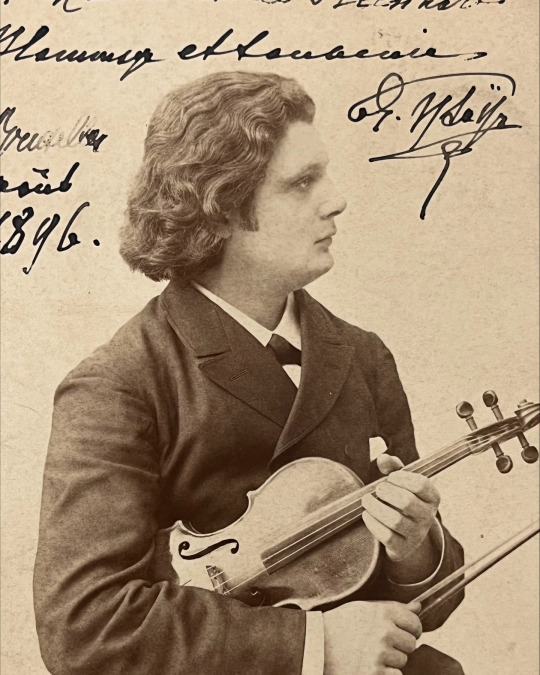

OTD in Music History: Legendary composer and violin virtuoso Eugene Ysaye (1858 - 1931) dies in Belgium.
One of the greatest violin virtuosos in history, Ysaye might well have received one of the single most wonderful wedding gifts in the entire recorded history of music: On the morning of this wedding, Cesar Franck (1822 - 1890) presented Ysaye and his bride with the score to Franck’s freshly-composed Violin Sonata, which was also dedicated to Ysaye.
Franck’s Violin Sonata is arguably his single greatest masterpiece, and it is undoubtedly one of the most famous and beloved violin sonatas ever written. The history of this work actually presents a rather intriguing mystery: In 1858 (the year that Ysaye was born), Franck had promised to compose a violin sonata for Franz Liszt’s (1811 – 1886) daughter, Cosima, on the occasion of her marriage to her first husband, pianist-conductor Hans von Bulow (1830 - 1894). This work never materialized – but the written correspondence documenting this promise has long fueled speculation that whatever efforts Franck put towards the promised 1858 piece (if any) might have ended up being incorporated into his 1886 masterwork.
While a normal person might have graciously accepted this lovely gift and then quickly turned his attention back to his nuptials, Ysaye (a true performer) instead commandeered a pianist and conducting a hurried rehearsal so that he could privately premiere the Violin Sonata *at his own marriage celebration*. (His bride’s reaction to this turn of events was not recorded.)
Ysaye publicly premiered the Violin Sonata at a concert in Brussels two months later, and it was his dedication to championing the work thereafter which helped to cement it as a fixture of the core violin repertoire.
PICTURED: A lovely cabinet photo showing the middle-aged Ysaye holding his violin, which he signed and inscribed to a friend in Brussels in 1896.
#Eugène Ysaÿe#Ysaÿe#virtuoso violinist#virtuoso#violinist#violin#Composer#classical composer#opera#classical music#music history#bel canto#aria#classical studies#conductor#The King of the Violin#Sonata#Cadenza#Waltz#Ballade#Orchestra#Concerto#Opera#chest voice#classical musician#classical musicians
36 notes
·
View notes
Text
Concert review, ★★★★, Can Çakmur @ Druckerei Baden (Piano District), Baden AG, 2022-11-19 — Mozart: Sonata No.13 in B♭ major, K.333; Schubert: Sonata in A minor, D.845; Liszt: Fantasy and Fugue on the Theme B-A-C-H, S.529/2; Mitropoulos: Passacaglia, Preludio e Fuga; Busoni: Transcription of Bach's Chorale Prelude for Organ "Ich ruf' zu dir, Herr Jesu Christ", BWV 639 / BV B 27/5
#rolfsmblog#concertreview#concert#recital#pianorecital#piano#liszt#pianodistrict#mozart#sonata#pianosonata#schubert#mitropoulos#busoni#bach#transcription#cançakmur#chaconne#ciaccona#çakmur#druckereibaden#choraleprelude#brahms
0 notes
Text
My Vinyl Collection!
*because idk I want to list things; I'll try to include the year it was published as well
Warning LONG LIST that I nearly cried writing because WHY are classical songs SO DAMN LONG?!
The Philadelphia Orchestra with Eugene Ormandy *unknown date
Afternoon of a Faun (Debussy)
Daphnis and Chloe, No. 2 (Ravel)
La Mer (Debussy)
William the Overture [Philadelphia Orchestra with Eugene Ormandy, again] *unknown date
Offenback: Orpheus in the Underworld
Smetana: The Bartered Bride
Thomas: Mignon
Suppe: The Beautiful Galatea
Highlights from the Sleeping Beauty Ballet by Tchaikovsky [Rias Symphony Orchestra, Herbert Charlier] *1957
... it doesn't list the songs ...
Tchaikovsky's Greatest Ballets: Suites from The Nutcracker/Swan Lake [Arthur Fielder/Boston Pops] *unknown date
The Nutcracker
Overture
March
Spanish Dance; Arabian Dance; Chinese Dance; Trepak; Dance of the Mirlitons
Waltz of the Flowers
Dance of the Sugar-Plum Fairy; Coda
Final Waltz
Swan Lake
Waltz
Dance of the Little Swans
Pas de deux
Hungarian Dance
Spanish Dance
Neapolitan Dance
Final Scene
James Last in Concert *unknown date
Side 1
Theme from "Elvira Madigan", Andante from the concert for piano and orchestra no. 21 in C. major, K. 467. Wolfgang Amadeus Mozart
Presto from the symphony no. 7 in A major, Op. 92. Ludwig van Beethoven
Romance for violin and orchestra in F major, Op. 50. Ludwig van Beethoven
Impromptu no. 2 in A flat major, Op. 142. Franz Schubert
Air from the suite no. 3 in D major, BWV 1068. Johann Sebastian Bach
Impromptu no. 3 in G flat major, Op. 90. Franz Schubert
Side 2
Adiago from the sonata "Pathetique" no. 8 in C minor, Op. 13. Ludwig van Beethoven
Slavonic Dance no. 10. Antonín Dvořák
Andante from the violin concerto in E minor, Op. 64 Felix Mendelssohn
Prelude 1 in C major. Johann Sebastian Bach
Andante from the symphony no. 5 in C minor, Op. 67. Ludwig van Beethoven
Ballet Music from "Prince Igor". Alexander Porfiryevich Borodin
April in Paris [The Melachrino Strings and Orchestra with Trio Musette de Paris] *1963
April in Paris
The Song from Moulin Rouge
Autumn Leaves
C'est si bon
J'attendrai
Madelon
La Seine
The Poor People of Paris
Clopin Clopant
Mon manege a moi; I love Paris
In a French Nursery Garden;
Sur le pont D'Avignon; Au claire de la lune; Frere Jacques
La Mer (Beyond the Sea)
The Piano Classics [unknown artists and date, European Import]
Fur Elise [Ludwig van Beethoven]
Impromptu Op. 142 no. 2 [Franz Schubert] Moment musical no. 3
Traumerei from Scenes of Childhood [Robert Schumann] The Prophet Bird from Woodland Scenes
Nocturne Op. 9 No. 2 [Frédéric Chopin]
Liebestraum [Franz Liszt]
"Raindrops" Prelude [Frédéric Chopin]
"Tristesse" Etude [Frédéric Chopin]
Barcarolle [Frédéric Chopin]
Clair de Lune [Claude DeBussy]
A Piano Invitation to the Dance [Ann Schein] *unknown date
Weber-Tausig: Invitation to the Dance, Opus 65
Medtner: Danza Festiva, Opus 38
Halffter: Dance of the Shepherdess (Danza de la Pastora)
Bartok: Roumanian Folk Dances
Bizet-Rachmaninoff: Minute from "L'Arlesienne"
Chopin: Waltz in D flat major, Opus 64, no. 1 ("Minute) | Mazurka is A flat major, Opus 59, no. 2 | Mazurka in F sharp minor, Opus 59, no. 3 | Polonaise Fantaisie in A flat major, Opus 61
Sander Van Marion: Improvisaties op het orgel in de Evangelisch Lutherse Kerk, Den Haag *unknown date (realized this was religious after further inspection, oh well, it's organ??? music)
PS. 72 ,,Laat Ons De Grote Naam Bezingen"
,,Als Stormen Woeden"
,,Loof De Koning, Heel Mijn Wezen"
,,Heer Van Uw Kerk"
,,Komt Laat Ons Voortgaan Kinderen"
,,O Hoogt" En Diepte Looft Nu God"
PS. 25 ,,Here, Maak Mij Uwe Wegen Door Uw Woord En Geest Bekend"
,,Alle Volken, Looft De Here"
,,Jezus Ga Ons Voor"
,,Neem Heer Mijn Beide Handen"
,,Wat De Toekomst Brenge Moget"
Lawrence Welk Polkas *unknown date
Hoop-dee-doo
Barroom polka
Julida polka
Dakota polka
Laughing polka
Emilia polka
Tinker polka
Kit Kat polka
Chopsticks polka
Russian Folk Songs [assorted choruses] *circa Soviet Russia
The stage coach is racing [Vot mchitsa pochtovaya]
Through the village [Vdol dyerevni]
Oh, my sweetheart [Ekh ty, duschechka]
The week [Nyedyelya]
The shades of night are falling [Noch uzh nastupayet]
Along the dusty road [Po pylnoy doroge]
Vanya can't sleep [Vanye nochenku nye spitsa]
In the Zhiguli hills [V Zhigulyakh]
The wide steppes [Shirokiye styepi]
Oh, you mists [Oi, tumany moyi]
Moravian polka [Moravskaya polka]
The chain-gang [Kolodniki]
@krenenbaker
#dove's vinyls#why does this one dvorak photo look like leonardo dicaprio?#DEAR GODS THIS TOOK FOREVER
5 notes
·
View notes
Note
What’s the story of your life with music?
The main reason I’d avoided responding to this question was that it’s too daunting. How do I make a narrative out of my interests and hobbies over the years? What can I remember exactly? I don’t want to go on and on, but…
My life with music started in…maybe kindergarten? In elementary school music class my teacher showed us Disney’s Fantasia, where my most vivid memories are of the Bach and Tchaikovsky segments. With Stokowski’s transcription of the Toccata and Fugue, I picked up associating music with colors and shapes, and often when I listen I still think in abstract geometric figures, especially imagining the sheet music floating around and changing colors. And from the Nutcracker suite, I went more Romantic and created stories in my head while listening.
At the same school, the fourth grade class would put on a play version of the Nutcracker story with some music from the ballet. I loved the whole “soundtrack” but especially a scene change with the piece “In the Pine Forest”
Growing up, I liked music but wasn’t really into the pop that my sister and cousins were into (Brittney Spears, NSYNC, Backstreet Boys, Spice Girls…), but I’d play around on my cousin’s out of tune piano and “taught” myself how to play Big Ben’s chimes using the black keys. My parents got me lessons with my cousin’s piano teacher who was an old Italian woman who introduced me to Chopin, Beethoven, and Rachmaninoff.
As I got more into music through YouTube and iTunes, my tastes solidified around Chopin, Liszt, Rachmaninoff, Alkan, Scriabin, heavy handed romantic piano. More “Romantic” Beethoven, some “darker” Mozart, and Bach’s organ music. Again couldn’t relate to peers when I got to high school. Yeah I liked Lady Gaga and Beyonce, but I didn’t care about any of the bands kids talked about, and didn’t like a lot of the 00s pop singers. Too many of the works I was into at the time were 19th or early 20th century piano. I was embarassed when guys asked if I listened to anything “hard” and showed them one of Prokofiev’s “War” Sonatas
I loved looking up the history of the works. At the time I thought it was just trivia but the longer I researched, the more I realized it was helping me develop an awareness of how we percieve reality and the social and cultural forces that contribute to who we are and what we do, say, and create.
My first piano teacher passed away, which was kind of rough. She felt like a third grandmother, told me stories about her husband in “The War”, and recorded several Chopin pieces for her family to keep for posterity. I always think of her when I listen to Chopin’s Waltz in Ab, op.69 no.1. Maybe too Romantic of me to bring up the “Farewell Waltz” nickname.
In general I had a very Romantic, and somewhat closed-minded, attitude toward music going through into college. I was kind of snobby against popular music styles, I was convinced Mozart was overrated elevator music, that Satie was a “one-hit-wonder”, and that there was no point in listening to anyone before Bach. Thankfully a lot of taste changes happened through college as I explored the repertoire more and got familiar with Mozart, ‘classical’ Beethoven, Brahms, Haydn, Handel, Hildegard von Bingen, Palestrina, Mahler, Hindemith, Barber, Schoenberg, and I won’t keep name dumping but when thinking back to my time at college I have a lot of memories of how I felt listening to music and pondering life in the way college students are expected to do.
I’ve always been an amateur pianist, and have been self-taught for the past ten years or so. And a lot has changed in my tastes and attitudes.
Still a Romantic at heart but I try to treat music as “objectively” as I can, let it speak for itself, and try to keep the era in mind when asking “what does this mean? What is this trying to convey?”. I’ve tried letting go of biases so I can appreciate other genres more. I’ve also been engaging more with the musical avant-garde, and am on the more liberal side of the aesthetic “culture wars” that have been going on since the mid 20th century.
Right now my favorite composer is Olivier Messiaen who I believe without any irony is the best composer of Christian music, and maybe the only Western composer who conveys a Christian sense of the Divine to the “greatest” extant possible. Of course that’s my own opinion, but for me the 20 Regards sur l’enfant-Jésus is the greatest work of piano music I’ve heard. The idea of best or greatest when talking about art is pretty silly, and the older I get the more hesitant I am to try and argue for something as arbitrary as “best”, so maybe I’d say that Messiaen is the closest to my heart, along with Chopin, Liszt, Scriabin, Debussy, Mahler, and R. Strauss.
And I don't really talk about my personal life so much, but I have a complicated faith in Christianity, and I'm a gay man, and maybe it's silly but music has been integral to my understanding of life and the self.
#classical#ask#music#classical music#my music journey#Chopin#messiaen#bach#beethoven#Mozart#scriabin#mahler#debussy#strauss
20 notes
·
View notes